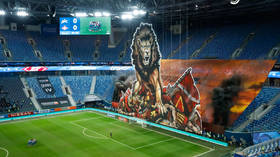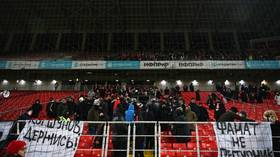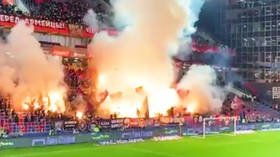Russian football fans make drastic move against ID rules

Russian football fans are protesting that football stadiums are "not prisons" after announcing that they will be shunning their beloved clubs' matches in opposition to controversial new fan ID requirements which are due to be introduced in summer 2022.
Politicians moved in December 2021 to adopt the third and final reading of the bill to bring in the new system, which will reportedly cost around $10.5 million to implement, on June 1.
Supporters have already carried out protests including mass premature departures from matches over the plan, which includes measures to restrict them to buying tickets via a portal system that will hold their data.
Russian Premier League side Spartak Moscow's vast Fratria group has announced an immediate boycott of games in response, with followers of reigning champions Zenit St. Petersburg and Rostov, who used to be managed by national team boss Valeri Karpin, said to be following suit.
"We are united in our position. We refuse to accept the rules imposed on us: passports, identifiers and the fan ID law," Fratria said in a statement, suggesting that supporters who attend games in the league, domestic cup, European competitions and other games where a mandatory ID system is applied will be considered traitors.
"Our boycott starts from now and will last until the complete repeal of the adopted law.
"The boycott applies to all fan associations, organizations and teams that identify themselves with Spartak, Moscow, Russia, the CIS countries and the whole world.
"Not a single law, not a single document and not a single official can deprive a fan of his sacred right: to be close to his club, to be part of its history, to consider the stadium and sector as his home, to openly express his emotions and opinions.
"In our blood, our ideology was, is and will forever remain the main principle – the support of our team.
"At any time, despite the results, restrictions, pressure from law enforcement agencies and other circumstances, we remained close to Spartak.
"However, the current situation and repressive innovations do not leave us the opportunity to make a decision other than this – difficult, but balanced and the only right one in the current situation."
Individuals could be denied a Fan ID or have their documentation and permissions frozen for public order offenses at matches in Russia and abroad.
Shortly before the bill was passed, an incident at CSKA Moscow saw more than 400 fans detained by riot police after dozens of people set off flares.
Security personnel blocked an entire section of supporters from leaving in an attempt to identify those responsible following the mysterious hacking of stadium CCTV cameras, with fans said to have been led into waiting police vans hours after the final whistle.
Backers of the bill, such as politician and three-time Olympic figure skating champion Irina Rodnina, have argued that it needs to be implemented in order to identify people acting unlawfully and ensure people are safe inside stadiums.
Critics of the legislation have included RPL side Ural's president, Grigory Ivanov.
Ilya Gerkus, a former president of Lokomotiv Moscow, reportedly called the boycotts "logical based on the dynamics of the situation" because he felt that law-makers had not carried out sufficient discussions with fans.
"This is the correct and almost the only acceptable reaction," he told RIA. "Now we are waiting for the response of the sports authorities, their words and actions.
The Fratria vowed to continue supporting Spartak by any means available to them beyond attending games.
"The emotions of the sector, the crowded roaring stadium and tens of thousands of hearts beating in unison have always been the most important part of life for us," they said.
"We consciously give up what was so dear to us in the name of one single goal: to protect the rights of everyone who considers themselves a fan.
"So our position is stated. Everyone who identifies with football must make their choice.
"The system will not stop – having got rid of the fans, having cleared the active sectors from the 'objectionable', its mechanism will ruthlessly start in a new direction.
"The law aimed at providing a 'comfortable and safe environment for football' will not only destroy the essence of fanaticism and its emotions, but will also cynically – without explanation and in violation of the presumption of innocence – deal with anyone who does not fit into the rules dictated by it, [including] ordinary fans, visitors to the 'family sectors' and VIPs.
"We declare that everyone who decides to ignore the declared position and stay at the stadium will no longer be able to look into the eyes of thousands of comrades-in-arms with honor and dignity.
"Anyone, regardless of his status and regalia, having crossed the line of the stadium at the time of our boycott, will momentarily cease to be part of the great Spartak movement and leave our ranks forever. A stadium is not a prison. Football for fans."
One fan on social media joked: "So to go to football you need a ticket, a QR code, Fan ID showing your location, an agreement from the police, the blessing of the church, a written undertaking not to leave and permission from your wife."
The protests could have a noticeable impact in the stands: Zenit's Gazprom Arena home has 68,000 seats to fill at full capcity, while Spartak's Otkritie Arena can hold 45,360 supporters.
Fan ID systems were used in Russia at the 2017 Confederation Cup, the 2018 World Cup and Euro 2020 matches held in the country.














